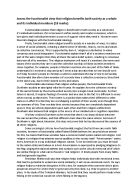Robert K Merton (1973) argues that science can only thrive as a social institution if it receives support from other institutions and values. He argues this first occurred in England with the protestant reformation and especially development of puritan beliefs. Merton argues science is an institution that needs an ethos; a set of norms that make scientists act in ways that serve to goal of increasing scientific knowledge. He identifies four such norms called CUDOS – Communism; scientific knowledge is not private property. Scientists must share it with the scientific community (by publishing findings), otherwise science cannot grow. Universalism; The truth or falsity of scientific knowledge is judged by universal, objective criteria (such as testing) and not by the particular race, sex etc of the scientist who produces it. Disinterestedness; This means being committed to discovering scientific knowledge for its own sake. Having to publish their findings makes it harder for scientists to practise fraud, since it enables others to check their claims. Organised scepticism; no knowledge claim is regarded as sacred. Every idea is open to questioning, criticism and objective investigation.
Marxism sees society divided into conflicting classes, a minority ruling class who own the means of production and the majority working class who are property less and are forced to sell their labour. The capitalists exploit this to produce profit, thus it’s in the workers interests to overthrow capitalism and replace it with a communist society where the means of production are owned collectively, not privately and used to benefit society as a whole. For the revolution to occur, the working class must develop class consciousness. However the ruling class also own the production of ideas, through institutions such as the media, education ect. There produce ruling class ideology, ideas that legitimate the status quo. Ruling class ideology includes the idea equality will never work because it goes against human nature, victim blaming ideas about poverty, racist and nationalist ideas to divide workers. Thus dominant ideas are ideas of the ruling class and they function to prevent change by creating false consciousness among workers. However despite ideological barriers Marx believes the working class will develop true class consciousness and unite to overthrow capitalism.
Gramsci (1971) refers to ruling class ideological domination of society as hegemony. He argues the working class can develop ideas that challenge the ruling class hegemony. This is because in capitalist society workers have a dual consciousness, a mix of ruling class ideology and ideas they develop from their own experience of exploitation and their struggles against it. It’s thus possible for the working class to develop class consciousness and overthrow capitalism. Gramsci argues this requires a political party of organic intellectuals; workers who have developed class consciousness and can spread it through the working class.
Feminists see gender inequality as the fundamental division and patriarchal ideology playing a role to legitimise it. Because gender differences are a feature in all societies there exists different ideologies to justify it. For example Pauline marks (1979) describes how ideas from science were used to exclude women from education, such as the idea education would lead to women being unable to suckle infants. In addition to patriarchal ideologies in science those embodied in religious beliefs and practises have also been used to define women as inferior. For example women being unclean due to menstruation. However not all elements of religion subordinate women. For example in the early history of the Middle East before the emergence of monotheistic religion female deities were widespread.
In conclusion, science, religion and ideology are all different types of belief systems, as some come from empirical and hardcore evidence whereas some are formulated strictly on belief and through passing down such ideas from various generations from a wide selection of cultures. Science is based upon falsification and disproving existing theories until they are unable to be disproved any further and therefore is not based off of just lore, or anything even remotely speculated to be false.









